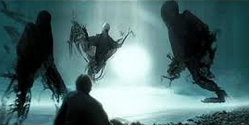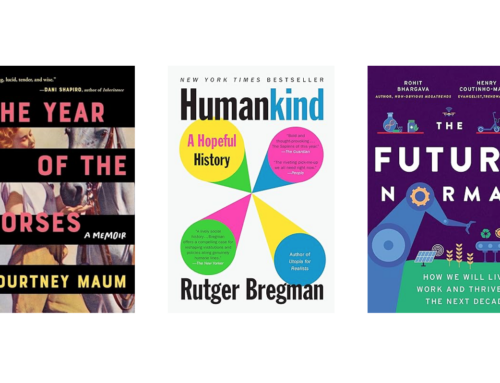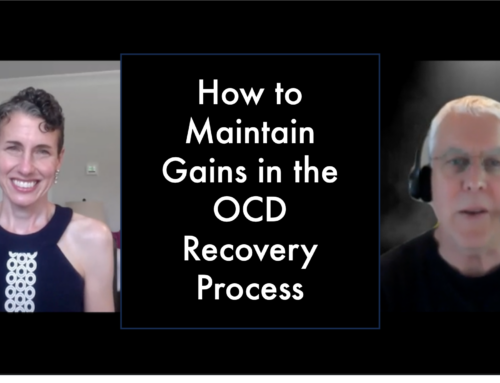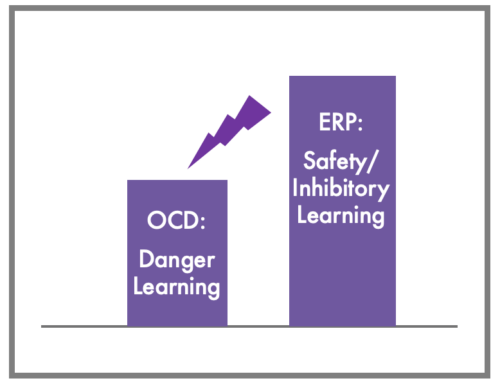For as long as I can remember, I have personified my OCD and thought of it as an entity separate from myself. Now I don’t have a specific picture of what my disorder looks like, although the  shadowy, menacing figure of a dementor from the Harry Potter series probably wouldn’t be far off. Instead, my personification of OCD is more aural—I know how my OCD sounds: it has a vicious, deprecating, and demanding voice.
shadowy, menacing figure of a dementor from the Harry Potter series probably wouldn’t be far off. Instead, my personification of OCD is more aural—I know how my OCD sounds: it has a vicious, deprecating, and demanding voice.
WDNG
Before I received the right treatment for OCD, I felt like I had a radio station called WDNG (“All danger, all the time! Your home for the worst case scenario!”) constantly broadcasting death, doom, and destruction in my head. My OCD waxed and waned for a period of three decades before I got the right treatment, and when my OCD was active its voice was a ruthless reminder of the constant danger I was in or was causing. Here’s just a sample of what I heard:
 As a child, while lying in bed at night: “What is wrong with you? Why did you just see a movie in your mind of your parents getting their heads chopped off? You must want that to happen! You are going to make it happen! You better replay that whole scene in your mind again to undo that horrible thought. What kind of child would think that about her own parents?!?!”
As a child, while lying in bed at night: “What is wrong with you? Why did you just see a movie in your mind of your parents getting their heads chopped off? You must want that to happen! You are going to make it happen! You better replay that whole scene in your mind again to undo that horrible thought. What kind of child would think that about her own parents?!?!”
As a young adult, while working in sales: “You know that business proposal you’re about fax? I’m pretty sure you put a swear word in that 20-page document somewhere. You know that word popped into your mind while you were writing the proposal. What if you put it in there? What would your customers or your boss think of you? Your career would be ruined, because honestly, who does that? You’d better check it again, or you can just kiss your sales career goodbye.”
In my thirties, while walking through Target: “Did you see that price tag lying on the floor in the aisle you just passed? Someone could step on it, slip, fall, and break their neck. And it would be all your fault, because you could have done something to prevent it and you didn’t. In fact, the security cameras probably caught you walking by without doing anything, so everyone will know what kind of negligent, irresponsible person you really are. Shameful….you are just shameful.”
Can you imagine what it’s like to listen to that? Welcome to the hellish world of obsessive compulsive disorder. Listening to that voice all day long felt like living the line from the song Hotel California….”you can check out, but you can never leave.”
By the way, to hear a little more about WDNG, you can listen to a 1:22 minute clip from “Is Fred in the Refrigerator?”
Not hearing voices
So we can sum this all up by saying I was hearing voices, right?
Wrong.
“Hearing voices” is very different from hearing the voice of OCD. From attending five International OCD Foundation conferences, I have made many friends who have OCD, and many might describe OCD as a “voice.” That’s because OCD is loud and insistent—those obsessions are going to make themselves heard, no matter what it takes!
However, while I heard the voice of OCD loud and clear before I got treatment, I was not psychotic. There was no psychosis because I knew that my mind was producing that voice. I knew that my obsessions and compulsions were irrational. I just couldn’t stop them. I just couldn’t turn off WDNG.
The voice of anxiety gets its fifteen minutes of fame
After listening to the voice of OCD threatening and taunting me for years, I could completely relate to the following short article in the satirical paper The Onion called “Man’s Anxiety Not About To Let Depression Muscle In On Turf”:
PHOENIX—Unwilling to cede decades of hard-won advances, local man Roger Cannon’s persistent anxiety vowed Monday that it would not let clinical depression muscle in on any of its turf. “Look, I’ve had a vise-grip on this guy for 30 years, so I’m not about to roll over now and let some despondent feelings and an overriding aversion to activity waltz in and take over his emotional state,” said the mental disorder, adding that it would “crank up” Cannon’s irrational worrying, restlessness, and agitation to drive depression out of its territory once and for all. “Roger’s mental condition is my domain. And if all-encompassing thoughts of hopelessness and inadequacy think they can parade around like they own the place, trust me, they’ve got another thing coming.” The neurosis then promised that it wouldn’t make the same mistake it did in 2011, when it briefly let its guard down and disastrously allowed happiness to take hold.
While The Onion produces spoof articles, its representation of the voice of anxiety couldn’t be truer.
Unquotable quotes
If The Onion had interviewed my OCD before my treatment with exposure and response prevention (ERP) therapy, it would have spouted off some of the following:
“Shala absolutely, positively has no clue what’s good for her. Thank goodness I’m around to protect her from the evils in this world. Not that I get any thanks for it, of course. She’s totally ungrateful.”
 “Imagine a sterile white box in a big white room, secluded from the rest of the world. My goal is to get Shala to live in that box, where I can have 100% certainty that nothing will ever hurt her. Most people don’t know this, but 100% certainty is possible if you just focus enough of your energy and attention on getting complete control of everything in your life. I have made inroads, getting her to give up more and more of what she so naively calls “freedom” (which, of course, are really just unnecessary risks). She hasn’t even noticed that I’m slowly taking over her life. It will only be a short time until I have absolute control, and Shala will be in that box where I want her.”
“Imagine a sterile white box in a big white room, secluded from the rest of the world. My goal is to get Shala to live in that box, where I can have 100% certainty that nothing will ever hurt her. Most people don’t know this, but 100% certainty is possible if you just focus enough of your energy and attention on getting complete control of everything in your life. I have made inroads, getting her to give up more and more of what she so naively calls “freedom” (which, of course, are really just unnecessary risks). She hasn’t even noticed that I’m slowly taking over her life. It will only be a short time until I have absolute control, and Shala will be in that box where I want her.”
“I have had Shala in my grasp since she was 4 years old and got hit by that car. You think she can get rid of me? Yeah, right. She can’t live without me. I own her. Do you hear me? She’s mine.”
Before I finally found ERP, my OCD was arrogant, aggressive, and overly confident in the righteous views of its role in my life. And unlike Roger’s anxiety, it was not successful in keeping depression out, and together they made a nice little team whose mission was to ruin my life.
Turning Down the Volume
Going through ERP therapy took most of the power away from that voice, because I learned how to deal with it. Instead of fighting what the voice says, I just accept it and all the uncertainty it is threatening: “You’re right, OCD. There may or may not be a swear word in that document. I am not going to listen to you and check it. I’m just going to send it anyway.”
I also purposely poke my OCD by doing exposure exercises frequently, like eating off the floor and not washing my hands often (I know, there goes that dinner invitation you were about to send me….), because I want to remind OCD of how I have no desire to be in its box.
Personifying my disorder as a voice actually makes it easier for me to deal with OCD. While the voice is mostly a faint echo now, when it tries to talk I can still hear traces of its arrogance. Paradoxically, OCD’s over-confidence motivates me to feel and act more powerful, which in my opinion makes my ERP even more effective.
So what do I have to listen to now? I am thrilled to say that going through ERP therapy and doing maintenance ERP keeps WDNG and the voice of OCD on mute most of the time.
Ah, blessed silence.








Leave A Comment